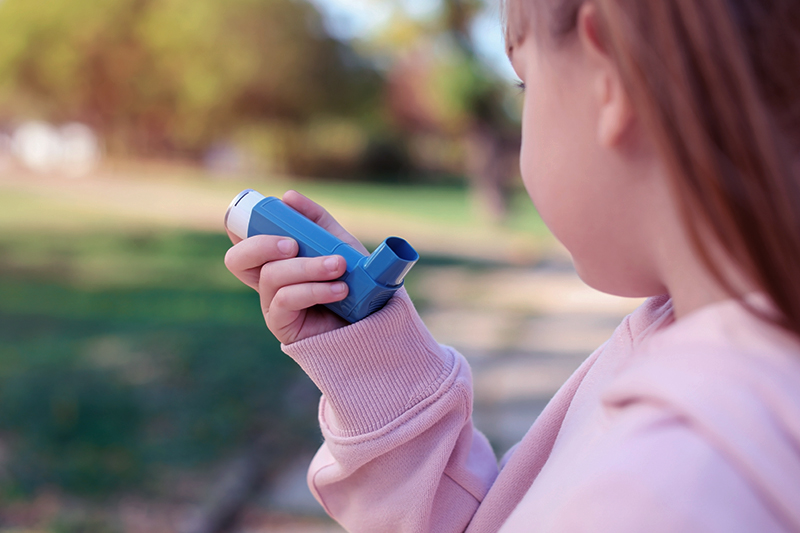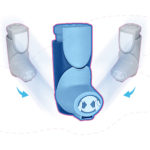Five ways to help manage your child’s asthma this school year

While fall is a time of considerable change for children — a new school year with new challenges — it can also be especially difficult for those with asthma. Between viruses, allergies, and colder air, asthma triggers increase for many children in the fall.
Late summer is an ideal time to ensure your child is in the best position to manage their asthma during the fall and winter. Drs. Jonathan Gaffin and Tregony Simoneau of Boston Children’s Severe Asthma Program offer five suggestions for how parents can do that before the first bell of school rings.
Have the proper medication ready
Asthma sometimes doesn’t flare as often in summer as it does in other seasons, so it’s easy to overlook that your child might soon need their emergency inhaler for sudden attacks. And, if prescribed, long-term controller medications will also need to be at hand. Now is the best time for your child to see their pediatrician or asthma specialist to determine which medications they will need and how often they should take them.
“Doctors want to prescribe the least amount of medicine that a child needs to remain well and keep their asthma well controlled,” Dr. Simoneau says. “But if you’re considering a medication change — thinking that your child may be ready for a step down or up — you should make that decision with a pediatrician instead of on your own.”
Check your health insurance coverage
Your child’s prescriptions might be current but there’s a possibility your health insurer has recently changed coverage. In July, several insurers changed their lists of covered drugs, affecting many children with asthma, Dr. Simoneau says.
“If you have difficulty refilling, reach out to your provider so they can ensure your child doesn’t have a lapse in controller medication,” she says.
Help your child establish a routine
“Adherence to medication is the most effective way of helping kids with asthma thrive and keeping them healthy through respiratory illnesses,” Dr. Gaffin says. Back in the indoor environment of school, your child will be exposed to respiratory viruses, and fall is peak season for pollen and molds, as well as colder air. It’s a “perfect storm” for triggering asthma, he says.
It’s easy for a child to fall out of their prescribed routine for controller medication, especially during summer when schedules are relaxed. Fortunately, it’s just as easy to help them get back on track, the doctors say. Have your child take their medicine in the morning and evening before they brush their teeth, for example. Electronic devices can also help: Encourage them to set an alarm on their smartphone, or even place their medication next to their phone charger so they will associate a dosage with plugging in and unplugging their device.
Make sure your child’s school has a current asthma plan
An asthma plan describes for school nurses and teachers which medications your child needs to take daily. It also details what to do if they’re sick or exposed to an asthma trigger — what’s known as a “yellow zone.” Typically, your child would then need their emergency inhaler. A “red zone” — when asthma doesn’t subside or worsens — calls for more rescue medication and is a prompt to seek outside help. The plan also authorizes your child to take medication on school grounds. Make sure your child’s school has a current plan from your pediatrician’s office.
It’s an ideal time for a flu shot
Consider scheduling a flu shot for your child before school starts or not long after. It’s only a matter of time before the flu will circulate at school. Protecting your child against influenza viruses will go a long way toward preventing respiratory illness and asthma attacks, the doctors say.
These five steps should help keep your child’s asthma in check and let them focus on learning and extracurricular activities. “Most children shouldn’t be limited in their activities because of asthma,” Dr. Gaffin says. “If it causes limitations, you should reach out to your provider to improve your child’s asthma control.”
Learn more about the Severe Asthma Program.
Related Posts :
-

(Virtually) visiting the home to help control childhood asthma
Many children have difficulty taking their asthma medicine on a regular basis. Sometimes it’s a matter of feeling well ...
-

Addressing inequities in asthma by focusing on children’s environments
Asthma strikes children in low-income urban areas especially hard, more often sending them to the hospital. For more than 20 years, ...
-

Trial for severe asthma targets a mutation common in children of color
Children and adults of color have higher rates of asthma than white people, as well as more hospitalizations and deaths. ...
-

SMART: A new approach to asthma management
Until recently, the typical approach to asthma involved two inhalers. In its first update since 2007, the National Asthma Education and ...





